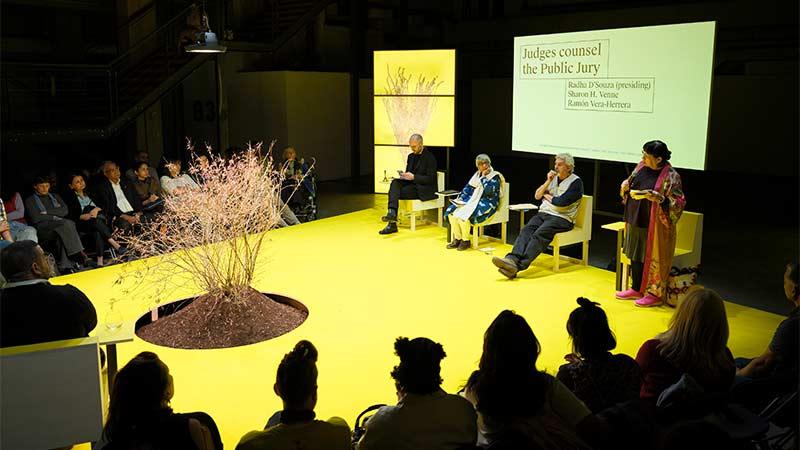The University of Westminster collaborated with Serpentine Galleries, the University’s Law, Development and Conflict Research Group (LDC) and the Centre for Research and Education in Arts and Media (CREAM) to bring together the Court for Intergenerational Climate Crimes (CICC), led by academic, lawyer, writer and activist Professor Radha D’Souza and artist Jonas Staal.

The CICC is a project that holds public hearings in immersive, performative courtroom installations to put states and corporations on trial for intergenerational climate crimes committed in collusion. These hearings address crimes of the past, present and future, reflecting the intergenerational impacts of climate crimes on ecologies and communities.
The project’s exhibition and events series were held between 4-24 April at Ambika P3, as part of CREAM’s Ecological Futurisms initiative, on the University’s Marylebone Campus.
The series began with an opening reception where Professor D’Souza and Staal discussed art, ecological justice and the crimes of the British East India Company. This was followed by three public hearings staged by the CICC prosecuting intergenerational climate crimes committed by the British East India Company. These hearings explored how the British East India Company, working in partnership with the British Crown, contributed to long-term harm against communities and the environment. Witnesses presented evidence on the legacy of colonial rule, forced labour, destructive farming practices and how these historical actions continue to shape climate injustices today.
One session focused on the indigo trade and its role in creating early agribusiness models that harmed local ecologies. Another examined how the Company and the Crown disrupted people's relationship with the land through slavery and captive labour, leading to environmental break down such as deforestation and monocropping - the practice of growing only one type of crop on the same land, which can deplete soil nutrients and harm biodiversity.
Following the public hearings, Ambika P3 hosted the CICC courtroom installation with selected materials from the tribunals in combination with the CICC School Programme. Developed by Professor D’Souza with Professor Neal White and Professor Roshini Kempadoo from CREAM’s Ecological Futurisms research group, this ongoing programme of lectures, workshops, screenings and discussions sought to deepen the relationship between artistic and legal imaginaries in the struggle for climate justice.
By engaging with this staged court, students gained hands-on experience in combining Law, History and Art to better understand environmental justice. The format allowed them to explore legal processes creatively while critically examining real-world issues like colonialism, climate action and institutional responsibility.
Staal and Professor D’Souza said: “Our institutions are neither natural nor given. They were imagined and constructed by humans, and they can thus be dismantled, re-imagined and transformed by humans. It is only in interdependency that we can practice comradeship across earth workers in a new planetary united front.”
Lucia Pietroiusti, Head of Ecologies at the Serpentine, added: “An essential, timely, generous and committed project, the CICC moved hundreds of audience members and gathered dozens of participants from all over the world. It was a landmark project for Serpentine Ecologies, marking its commitment to artist-led environmental-justice efforts. As poetic as it is engaged, CICC’s London iteration drew essential and little-known connections between the British East India Company’s operations and the way in which systems and structures of ecocide are organised today.
“The collaboration with Westminster was essential on multiple accounts. Firstly, the former testing facility of Ambika P3 provided the unique and perfect context for the ambitious installation. Further, CREAM and LDC in programming and producing the CICC School programme ensured the establishment of deep connections between the CICC’s hearings and concept, the London context, the student body, furthering research, engagement and participation.”
This event series directly contributes to the United Nations Sustainable Development Goals (SDG) 10: Reduced Inequalities, 13: Climate Action and 16: Peace, Justice and Strong Institutions. Since 2019, the University of Westminster has used the SDGs holistically to frame strategic decisions to help students and colleagues fulfil their potential and contribute to a more sustainable, equitable and healthier society.
Learn more about the Law, Development and Conflict Research Group and the Centre for Research and Education in Arts and Media at the University of Westminster.






